|
Corporal Chester
E. Brown and Private Ernest C. Johnson both served in France for as members of
Battery A, 102nd Field Artillery Regiment, 26th Infantry
Division. Both kept diaries somewhat
erratically during their service, sometimes writing retrospectively about
events that occurred before they began their records. Many days are neglected
by both, surprisingly few have
dual entries. Neither of the soldiers
mentions the other in his writings, although surely, they knew one another.
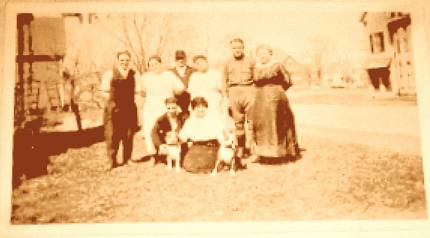
Chester Brown and His Family
Only Photo of Either Subject
To try to tell
the story of Battery A., the editors have
combined both writings and placed all the events in the chronological
order they happened. Brown's
recollections are in blue text, Johnson's in red. Commentary from editors Bob Ford and Kristen Kelly are in black. To maintain the voice, style, and intention
of the author, every attempt was made to transcribe the material exactly as
written in regard to spelling, grammar, and punctuation. Notes, comments, or
changes to the original manuscript are in italics and have been added to place
particular dates and events within an historical and military context. In some
cases, we corrected French place names when the accurate spelling could be
found using period maps. In others, we weren’t able to corroborate Brown’s spelling
with place names. The diary samples shown are all from the Brown diary. The action images are all from American Armies and Battlefields in Europe, 1927 edition.
April
20 1918
The
Seichprey Battle
Seichprey
battle commenced on the morning of the 19th of April 1918 and lasted till the
night of the 20th we were all prepared for our attack but the Germans started
it about quarter of 3 and then we went and finished it.
The
German attacked northwest of Toul, so the prisoners say to teach us Americans a
lesson. But the only lesson now so far as they see it is the Yankees can meet
about three times their number of German “shock” troops” and send them back
pretty heavily depleted.
The
German blow was delivered against the junction of the French and American lines
by special Saxon Storm troops, the only first class German units east of the
Picardy battlefield. Outnumbered enormously, their lines swept by a hurricane
of poison gas and high explosive shells. Our men exacted a price for every inch
of ground they yielded, and ultimately re-captured, by the fiercest
hand-to-hand fighting.
The
German positions were on high ground commanding the Allied trenches. Opposite
the enemy and behind our line there is a steep hill about nine hundred feet in
height, on whose furthest, or southwestern slope the village of Seichprey is
located. This hill on the right is steeper than on the left and may be approached
on a gradual incline, of which the greater part is covered by a small
rectangular grove called the wood of Reimiers.
It
was through this wood that the enemy started pushing our line back and
advancing about a mile and a half up to the slope of the hilltop, which gave
them a short lived command of the village.
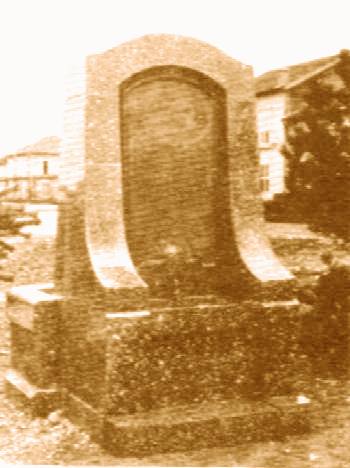
Monument at Seichprey Constructed by State of Connecticutt
The
attack began about quarter of three on Friday morning, after a deluge of shells
midnight onward. The enemy launched about three thousand men in three columns
each, preceded by picked storm troops on a mile and three quarters front.
On
the left and in the center the assault was repelled, but on the right the
Germans succeeded in bursting through and occupying the Remieres Wood in which
the eastern edge is a short distance behind our line. Throughout the day the
Germans pursued their usual tactics, that is gradual progress in small groups,
supported by quick fires, Covered by trees and favored by the nature of the
ground, the Germans reached the crest and delivered a heavy attack on Seichprey.
But
before dawn on Saturday the Americans and French had countered strongly and
recovered the village forced the enemy back to the hilltop above. The Germans
returned to the charge with about three battalions, led by perhaps 200 storm
troops. The Americans, supported by the French, met the attack without
flinching.
After
two or three hours of desperate fighting the enemy was driven down the slope
into the wood; where we, Btry A, peppered them. Throughout the morning there
was bitter fighting among the trees. Then about noon, the Allies swept forward
irresistibly and retook the wood completely.
Fighting
terribly the Germans were pushed away back beyond the woods to their own
trenches where they endeavored to maintain themselves. But a new advance, combined
with pressure from the flank, forced them to retreat, and by Saturday evening
they had retired to the original starting point, and our line was completely
reestablished.
We
had captured about 75 with losses about half the enemy. Our artillery were
doing wonderful damage along with our battle planes.
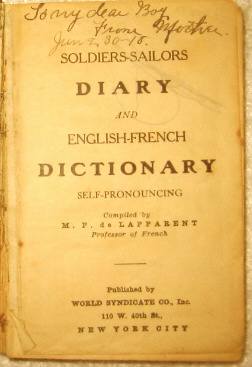
Diary Cover Page
July
8th
Heavy
firing all night
July
14th
Big
guns firing all night. No sleep.
July
15th
German
balloon shot down. Heavy firing on both sides.
The
night of the 15th July 1918 3 75s blew up, within 15 minutes of another nobody
hurt. At Chateau Thierry the Germans
started their offensive July 15th 1918 and we the 26th Div. came in and we
stopped them and started our drive the 18th and kept it up.
(On July 16,
1918, the Yankee Division was engaged in combat at Vaux and Torcy, Belleau Wood
sector. When the Franco-American
counter offensive against the Marne salient started on July 18th, the 26th was
on the right flank of the attack. )
July
21st
Left
the woods at Villiers (Villers-Cottêrets?) at 9:30 AM. Arrived at guns at
11:30. Left the old guns position past Hill 204. Saw a lot of dead Germans and
Americans in the fields and woods. Slept in woods all night. When we awoke in
the morning there was dead all around us. Sgt. Hestline was sent back to
America.
July
22nd
Carried
ammunition to the guns. Shells flying all around us. Dead horses everywhere.
German and American heads and legs laying in the gutter. Ambulance busy all day
bringing out wounded from H Battery.
July
23rd
Heavy
firing. Made another advance to Chateau-Thierry. Very little water. Dead
horses, Germans and Americans everywhere. Pvt. Caporina was wounded and died a
few minutes later. Lt. Vale was wounded in chin. Flynn was hit in arm. O’Brien
was kicked in the head. Six horses killed.
July
24th
Advanced
from Chateau Thierry about 7 kilos. Slept in woods with dead French, Germans,
and Americans all around us. Heavy fighting.
July
25th
Advanced
about 6 kilos. Move to another position. Heavy fighting on both sides. Germans
firing mustard gas. No sleep.
(Between July 21
-25 the 26th. Div. was engaged in heavy fighting in and around La Gonetrie
Farm, Bois de Bourches, La Croix Farm, Trugny, and Epieds. The 26th
Infantry Division sustained 5,000 casualties.)
July
27th
Heavy
firing all night. Moved about 6 kilos. So many dead laying in roads we had to
run over them with guns. Slept in woods. Rained all night.
July
28th
Carried
ammunition to front. Heavy firing on both sides.
July
30th
Heavy
firing on our side. 900 Germans captured.
July
31st
Heavy
fighting on both sides.
Aug.
2nd
Advanced
for 4th time through shell torn country. Slept in rain all night. Near Sergy.
This town changed hands seven times in one day.
Aug.
3rd
Made
another advance over shell torn roads. A lot of dead Germans and Americans
everywhere. Plenty of dead horses. Horses all tired out. Nothing to eat. Slept
in rain all night.
Aug.
4th
We
were (illegible) at 12:30 at night. Hiked all night. Passed through
Fere-en-Tardenois and stopped near deserted German hospital camp.
Aug.
5th
Left
German hospital camp 9:30 PM. Hiked all night. Arrived at Chateau Thierry 6:30
AM.
Aug.
6th
Left
Chateau Thierry 8:20 PM and landed at Montmararde at 6 AM.
Aug.
10th
Received
July pay.
Aug.
11th
Lost
$50.00 shooting craps
Aug.
13th
Left
Montumarde. Arrived at Chateau Thierry at 10 AM in trained and left at 4 PM.
Aug.
14th
Rode
all night in box cars. Arrived at Coincone 8 AM. Hiked 14 kilos to Pothiers.
Aug.
22nd
Went
on practice road hike. Pulled guns unto position. Fired by (illegible)
Aug.
23rd
Had
practice road hike.
Aug.
25th
Went
on pass to Chatilles Sur Siene
Aug.)29th
Left
Pothieres for Poincon. Arrived 8:30
Aug.
30th
Intrained
2:30. Arrived at Fronville. Had echelon in woods.
Sept.
Moved
to Loucourt. Slept in woods
Sept.
8
Took
guns to position and camouflaged them.
Sept.
11th
Carried
ammunition to guns.
Sept.
12th
Drive
is started.
(Begining
of St. Mihiel attack.)
Sept.
13th
Move
guns forward.
Sept.
16th
Moved
echelon near Mouilly
Sat
21
We
are on the Verdun sector and a place called St. Mihiael (Mihiel). We went to
Mouilly with 5 cassions (caissons) for ammunition
Sun
22
We
got a small shelling but not very bad. This morning we didnt have much to do
but groom as usual.
Mon
23
Went
three miles to Lavatiuel in the afternoon the Germans started shelling us and
at half past five or five we opened up a small barrage on them. Our piece was
picked for a gypsy gun and we went out at 8 oclock and fired a hundred rounds
and then came in.
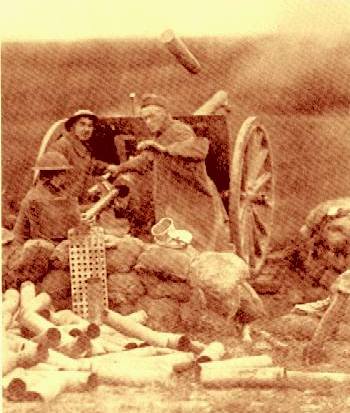
US 75 Firing
Tues
24
Camp
of the Fountain
Not
much doing only hauled 4 caissons load of ammunition in the night came in kind
of early and had lunch.
Wed
25
Not
much doing only hauled 4 caissons load of ammunition unloaded and then went
back and made one more load fired a box barrage.
(A
box barrage is a tactic whereby the artillery lays down curtains of fire around
three sides of the position being assaulted in a box pattern with the attacking
end open, preventing reinforcements from entering the area being attacked, or
anything in the area of the attack escaping.)
Thur
26
Not
much doing all day rained hard all day Went out about half past five with 4
caissons and went about a half a kilomater came back early and went to bed
Fri
27
Camp
De Fountaine, Petiate
Not
much doing all day but in the night we had to get out and haul ammunition to
have plenty for a box barrage.
Sat
28
The
Germans started a barrage and came pretty near blowing us up. Sgt LaBelle went
to the hospital. We started at them and got one of their guns shelling all day
and all night
Sept.
28th
(illegible)
echelon. Sgt. LaBelle hit in arm. Carried ammunition to gypsy gun. Carried
ammunition from (illegible)
Sept.
28th
(illegible)
echelon. Sgt. LaBelle hit in arm. Carried ammunition to gypsy gun. Carried
ammunition from (illegible)
Sun
29
We
are on our new horse line in back of our position on a big hill. Not much to do
but have horses groomed and keep up the necessary work.
Mon
30
There
was quite a bit of shelling on both sides nobody hurt. Not much to do but lay
around in the rain. Went to bed early, and froze all night.
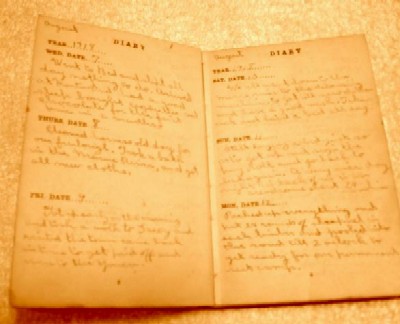
Sample Diary Pages
October
Tues
1
Another
day of shelling and they came pretty close to getting us No one thought of
moving horse line before they killed some men or horse. I hauled ammunition all
day.
Wed 2
We
got orders to move our forward horse lines, so we backed up and went back about
2 kilimeters on the side of a hill. Cpl Talton (?) and myself was in charge of
the horse line
Thur
3
St
Remy
Les
Asparges
We
had a good day. nothing doing until night when one limber went out to get the
roving piece (the Gypsy gun) and come right back.
Fri 4
Not
much doing only 3 limbers went out at 8 PM and made one trip with ammunition
and came back early.
Sat 5
Not much
doing only watching air battles all day. At night 2 limbers went out for forage
for the horse and came back and went to bed. They started a shelling
|

